
If you’re truly passionate about a particular field, a master’s degree may not be enough for you. You may feel the calling to teach others at the highest level, break new ground through research and innovation, or drive institutional change at the highest level. If you want to rise to the pinnacle of expertise in your field of interest, you may wish to consider a doctoral degree.
Doctorates are notoriously difficult to earn, requiring a serious investment of time and effort. That’s by design- this degree is meant to be an elite credential, awarded only to the most dedicated experts. For this reason, a doctorate is the rarest type of degree, with just 2% of Americans holding a doctoral degree. That’s one-third of the number who hold a master’s degree, and a mere eighth of the number who have a bachelor’s degree!

What is a Doctoral Degree?
The doctoral degree isn’t just the highest degree, it’s also the oldest, dating all the way back to the Middle Ages, when the Catholic Church began granting “licentia docendi,” a license to teach Latin at universities. The modern PhD stands for the Latin “Philosophiae doctor or Doctor Philosophiae” or “doctorate of philosophy.” The term “philosophy” in this case is a reference to the Greek word for “love of knowledge,” rather than the field of philosophy. Someone with a PhD can be said to have mastered their field of knowledge, and there are virtually unlimited numbers of different areas of study in which it’s possible to earn a PhD.
PhDs are just one kind of doctoral degree, however. We all know that medical doctors, for instance, hold doctorates, and that there are doctoral degrees offered in fields like Law and Management, which go by different acronyms and require different courses of study.
Doctorates fall broadly into two types: Research Doctorates and Professional Doctorates. Both are terminal degrees, and both allow the earner to use the term “doctor” in reference to themselves. The difference between the two lies in the process required to earn them and their career applications.
What is a Research Doctorate?
A research doctorate is what most of us think of when we hear the term “doctoral degree.” These are classic PhD programs which focus heavily on generating original research for publication in a peer-reviewed journal, and prepare students for a future of research or instruction as a tenure-track university professor. Most people who pursue a research doctorate progress straight from their master’s degree into a PhD program. Research doctorate programs require students to create and defend a dissertation as part of their studies, and tend to take about 1-2 years longer to earn than an equivalent professional doctorate, although this varies greatly by subject and program. Examples of this type of doctorate include:
- Doctor of Chemistry (D.Chem.)
- Doctor of Fine Arts (D.F.A.)
- Doctor of Library Science (D.L.S.)
- Doctor if Social Science (D.S.Sc.)
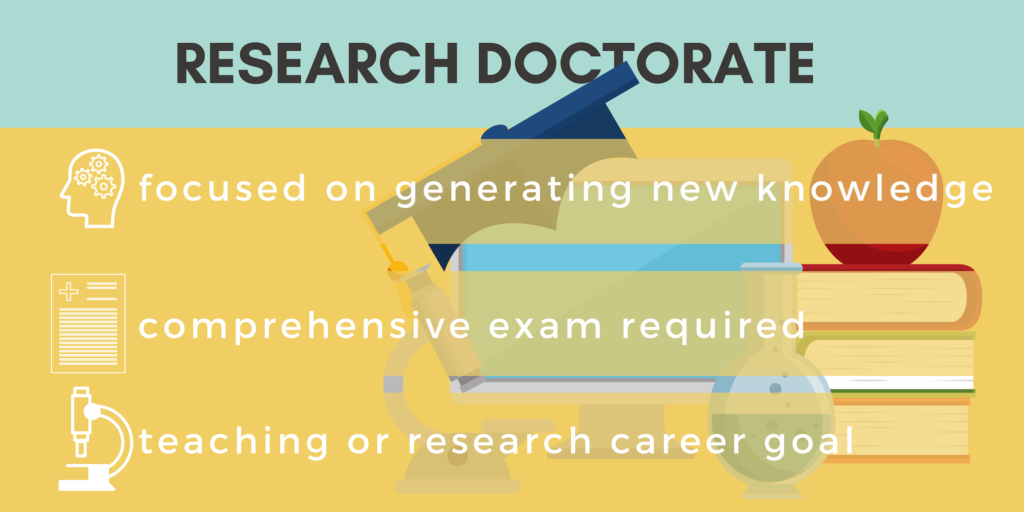
What is a Professional Doctorate?
While PhDs have been around for hundreds of years, the professional doctorate is a relative newcomer; these career-oriented terminal degrees have only been around for about 20 years. Also called an “applied doctorate” or “clinical doctorate,” a professional doctorate focuses less on research and more on the application of existing knowledge within one’s field of expertise. Most people who enter a professional doctorate program have practical experience in their field, and opt to earn a professional doctorate in order to move into a top-tier leadership role. In a professional doctorate program, you’ll be training to solve real-world problems and become a high-level agent of change. As such, you won’t be expected to generate original research (i.e. a dissertation) but to find new applications for existing knowledge (often referred to as applied research). Examples of this doctorate type include:
- Doctor of Business Administration (DBA)
- Doctor of Education (EdD)
- Doctor of Public Health (DrPH)
- Doctor of Nursing Practice (DNP)
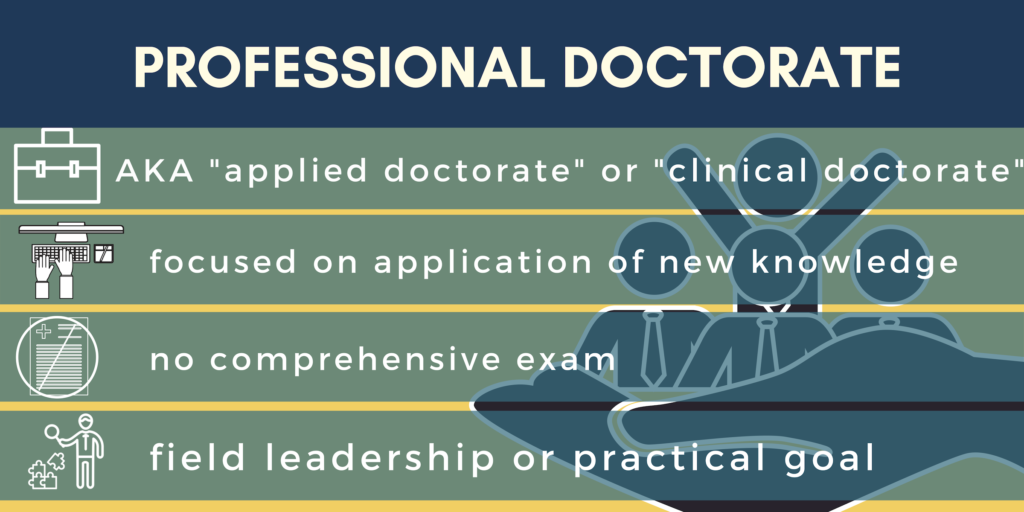
Interestingly, some fields offer both types of degree. Such offerings allow prospective doctoral students to aim for a career in research and/or instruction or one in fieldwork. For instance, it’s possible to earn a Doctor of Science in Veterinary Medicine (D.Sc.V.M.) or a Doctor of Veterinary Medicine (D.V.M./V.M.D.) depending on whether you want to have a veterinary practice or conduct veterinary research.
Why do People Pursue a Doctorate?
There are plenty of reasons to go after a doctorate… and many reasons not to as well. More than any other degree, a doctorate requires time, effort, expertise, guidance, and money, and many people drop out along the way before gaining their PhD. When asked why they want a PhD, 53% of people who choose to pursue a PhD cite “to progress on my current career path” as their reason for getting their degree, and 62% say they need a PhD to “pursue a career in academia.” A whole 42% also give “personal interest” as a reason- while people probably don’t pursue a degree this tough just for their own intellectual curiosity, you do need to have a lot of interest in a specific area to be able to sustain the level of commitment required to earn a terminal degree.
Of course, reasons to pursue a research doctorate tend to be more about academia and personal interest, and reasons to pursue a professional doctorate tend to be more about a career. With a professional doctorate, you’ll have the prestige and expertise to take on an influential role within your established field. For instance, a teacher who wishes to drive change within a network of school systems may wish to pursue an EdD in order to assume this leadership role.
What are the Requirements to Enter a Doctoral Program?
A doctorate is sometimes called a “terminal degree,” because it’s the highest available degree. Needless to say, you’ll have to start with a bachelor’s, then earn a master’s degree, before you can begin to enter a doctoral program. Most schools expect that those applying for a PhD program hold a bachelor’s with at least upper second-class honors, along with a graduate degree with high academic standing or an honors degree.
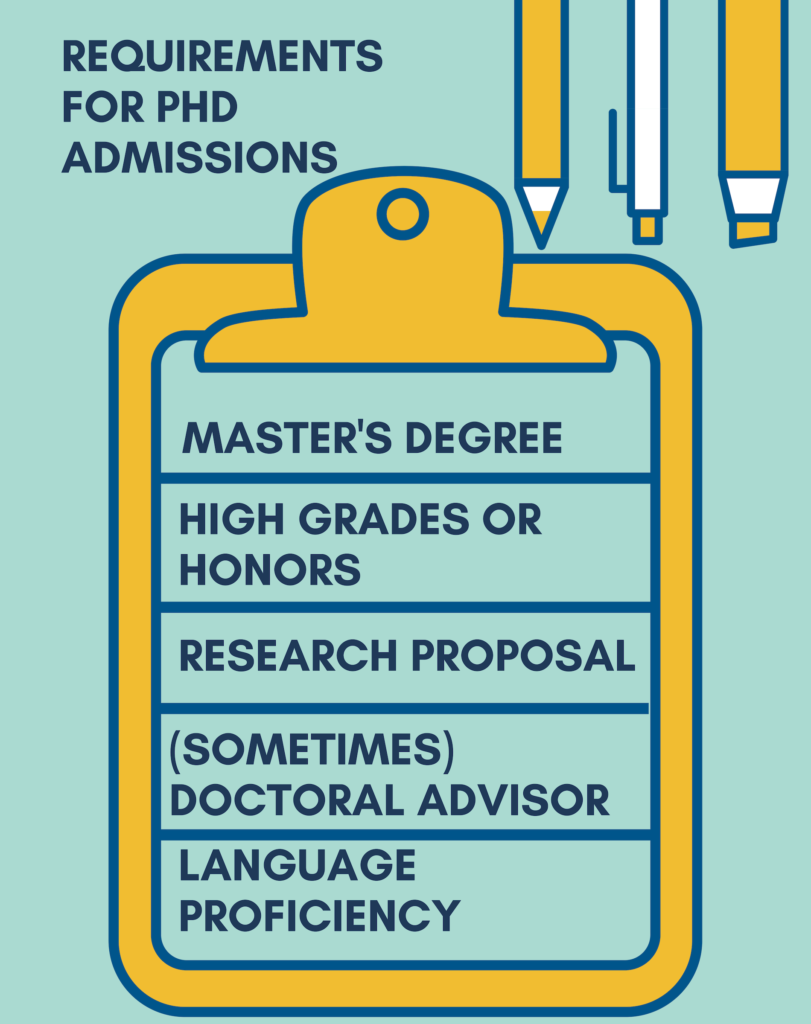
Depending on your area of study, you may need to find a doctoral advisor before you apply to a doctoral program. This is more often the case in psychology and the humanities. You will be working very closely with this tenured professor for several years, and schools often want to be sure that they have someone of staff who’s suitable for your research before accepting you as a PhD student.
As many as 50% of students pursuing science and engineering PhDs are of international origin. As a doctoral student, you’ll be expected to literally “write the book” on your thesis topic, whether you choose a humanities or STEM subject. You simply won’t be able to generate this much high-caliber content without complete fluency. For this reason, many schools require students interested in a doctoral degree to prove their language proficiency prior to admission.
If you have earned a master’s degree, you probably completed a research-based thesis in your second year, after having taken courses that introduced you to topics, trends, and areas of current research that stimulated your interest. In a doctoral program, you’ll also be conducting research and writing extensively about your findings. However, with a doctorate, you’re expected to identify your dissertation or applied research topic before applying to a doctoral program. That means that, for a research doctorate, you’ll need to study up on current knowledge in your field, identify gaps in the existing body of knowledge, and propose a topic of study that will generate completely new findings within that field. For a professional doctorate, you’ll want to find a real-world problem that interests you and study up on the current research that might be applicable in solving it. When applying to schools, you’ll submit a formal research proposal, which must show a thorough analysis of the existing research, identify your proposed dissertation or applied research study, and propose a specific methodology to address it.
What is a Doctoral Dissertation?
A doctoral dissertation is an essential part of a research doctorate. This undertaking involves identifying an existing gap in the current body of knowledge in your area of expertise, then conducting entirely new research into it. The findings must then be written up into a long document which is of a suitable caliber for publication in a peer-reviewed journal. Most programs also require you to defend your dissertation before a school committee. Students work on a doctoral dissertation for about 2-4 years and work closely with a doctoral advisor associated with their school, who guides their research and provides ongoing feedback.
In a professional doctorate, a dissertation is not required. Instead, you’ll be asked to research a real-world problem and propose a solution to address it. This component of a professional doctorate is known as applied research. You’ll formally draft this proposal, and will likely also present it to a school committee, who will question you on its content.
How Long Does it Take to Earn a Doctorate?
The road to a PhD isn’t just tough, it’s also long. Information from the Degree Completion Project study reveals that the attrition rate for doctoral programs is high- a full 50%. This is due in part to the length of time to completion. Many students may have life events interrupt their full-time studies, may find that their priorities change over this long period, or may come across career opportunities that make more sense for them than pursuing a PhD. If you’re determined to be among the 50% the complete their doctorate, you’ll want to be prepared for a long haul.
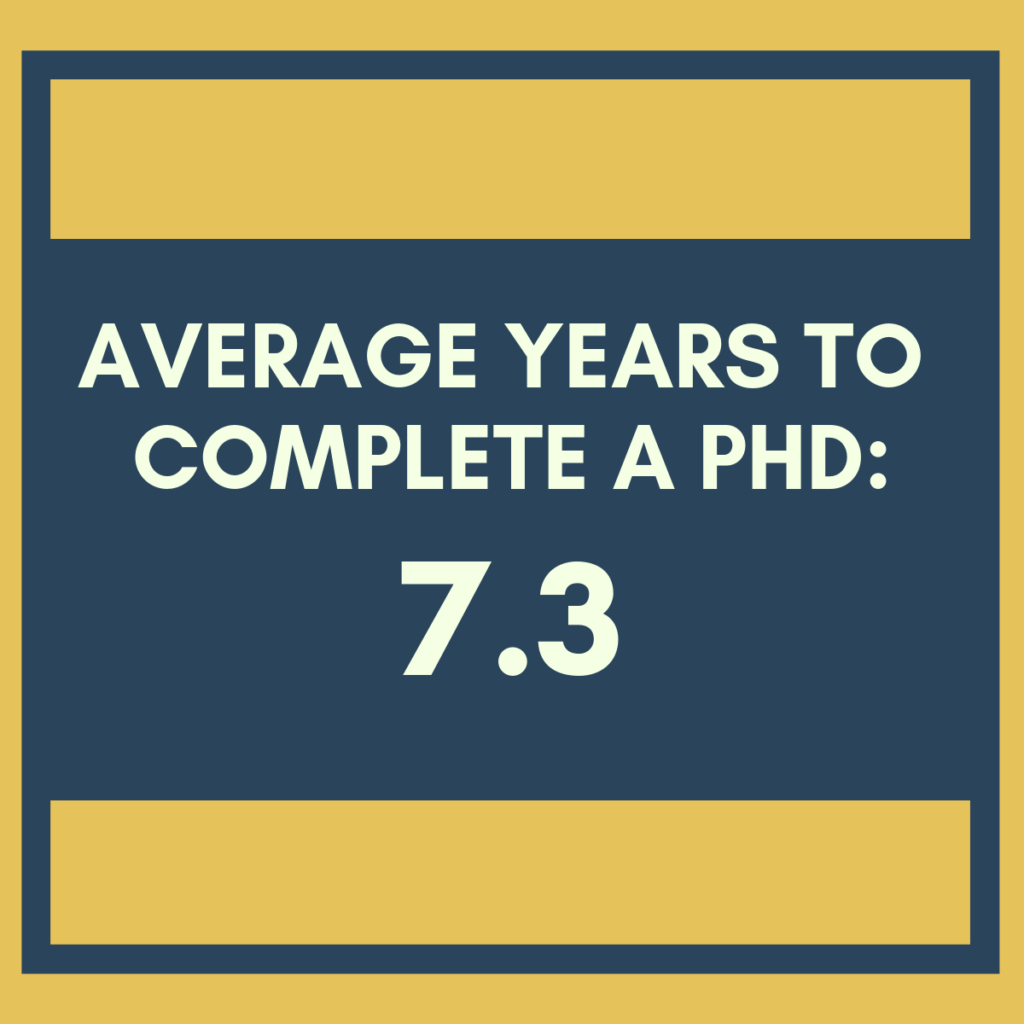
A study by the NSF in 2016 revealed that the average time to complete a doctorate was 7.3 years. This varies across disciplines. A doctorate in education took the longest, on average, to earn, at a total of 9 years. A doctorate in Science/Engineering averaged 7. Professional degrees tend to take less time, with an average closer to 5-6 years for full-time students, and sometimes as little as 3-4.
Your timeline will vary by subject and by school, of course. Generally, though, you can expect to spend your first 2-3 years on required and elective classes. After that, you’ll likely study for and pass a comprehensive exam to prove your mastery of the academic subject. You’ll then need to design, research, write, and defend your dissertation or applied research project. This can take anywhere from 18 months to three years, depending on the rigors of your analysis and subject matter.
Are there Online or Part Time Doctoral Degree Programs?
There are some doctoral degree programs which are offered on a part-time basis. These are still more rare than on-campus and full-time programs, which have been the traditional approach to both research and professional doctorates. However, today, the average age of a PhD recipient today is 35 years, and people at this age often have family and work commitments that make online or part-time enrollment preferable. Online and part-time programs are increasing in number, based on this demand, and this trend seems likely to continue, as the average age of higher education students increases across all degree levels. In a part-time or online program, your program requirements will remain the same as they would in a traditional doctoral program. You’ll still work with a doctoral advisor, develop a dissertation or applied research, and present it to a committee. You’ll have the added flexibility of working around your own location and/or schedule, but will need serious commitment to stick with a program without in-person, full-time contact with other academics.
How Can I Fund a Doctoral Program?
If you’re like most students, you’ll be taking several years away from the workplace to study full-time. How will you support yourself and cover the cost of tuition and fees during this long period? The high attrition rate for doctoral programs is well established, and financial instability for students certainly plays a major role in the decision to drop out for many doctoral candidates. You’ll want to have a realistic plan in place that will see you all the way through to graduation. There are a few sources of funds that doctoral students can use to pay for the cost of school and cover the cost of living while studying full time. These include:
- student loans
- personal resources
- income as a teaching assistant
- income as a research assistant
- fellowships
- grants
In the past, many students reported relying on their own resources to fund their doctoral degree (such as income from a spouse, savings, or loans). As of 2004, a full 25% across all academic disciplines relied on their own resources, according to the National Science Foundation. Today, that number has dwindled to 15%, and students pursuing a doctorate are increasingly relying on income earned within academia. The same survey found that 33% of doctoral students said that their primary source of financial support was employment as a research assistant, 20% work as a teaching assistant, and 27% relied on fellowships and grants. Most students use some combination of grants, loans, and academic employment to fund their doctoral degree. No one of these choices of primary income is necessarily better than another, so students must weigh for themselves which makes the most sense for their career track and personal finances. Relevant work as a teaching assistant or research assistant will enhance your resume, especially if you’re set on a career in academia.
What Jobs Can I Get with a Doctorate?
Professional doctorates tend to follow a very clear job trajectory. A doctorate in Nursing, Education, or Physical Therapy, for instance, will lead to a position in management or organizational oversight within that professional field. The job path for those with a research doctorate, on the other hand, is usually directed towards academia.
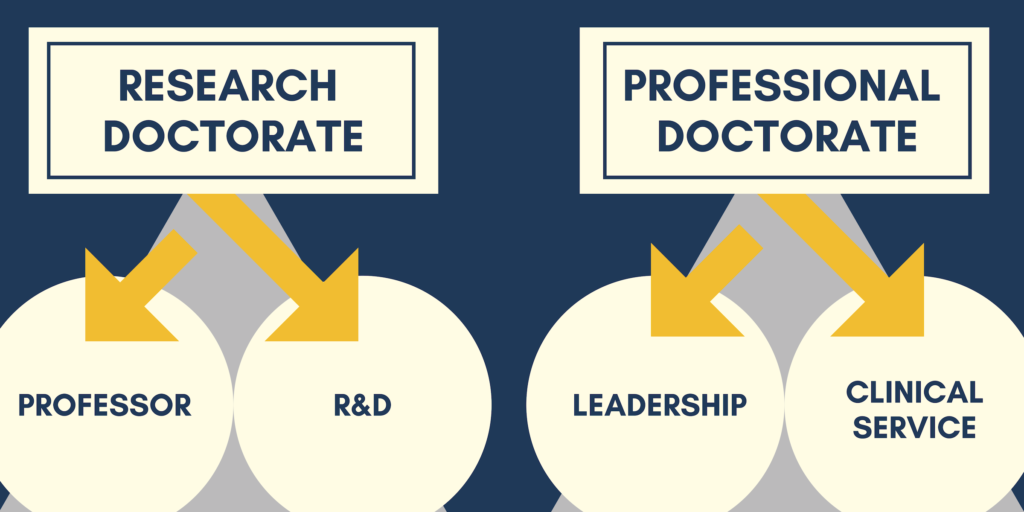
One of the most common reasons for seeing a PhD is to fund work as a tenure-track professor at a university. A doctoral degree is a requirement for almost all tenure-track teaching jobs. But that doesn’t mean you need a PhD to teach at a university- or that holding a PhD will land you a place as a tenure-track professor. The demand for tenure track faculty is much lower than the number of qualified candidates with a doctoral degree. That’s due in no small part to the elimination of these positions by universities, as they look to cut costs. Schools are leaning more heavily on temporary adjunct professors to teach classes. This lower-paying, less-secure position only requires a master’s degree. Unfortunately, those with a PhD who can’t get employment as a tenured professor may find themselves in this role, at least until a higher position opens up. Outside of academia, many people with a research doctorate in STEM fields find work in private companies, leading research and development teams.
What is the Job Outlook with a Doctoral Degree?
After you’ve completed the rigorous coursework and grueling dissertation process, and have your doctoral diploma in hand, you’ll likely be facing another uphill battle. That’s because the market for doctoral level jobs is extremely competitive. A PhD is a pinnacle degree, and there’s simply not a lot of room at the top at most universities. That leaves graduates holding a PhD facing stiff competition for existing jobs like tenure-track teaching and corporate leadership, or the prospect of settling for work for which they may be overqualified.
Some 75% of doctorates are awarded in the fields of Science and Engineering, and teaching jobs for those with STEM degrees tend to be easier to come by than PhD level jobs in the humanities. This trend reflects the broad push for STEM education at universities nationwide, and the lessening emphasis on the liberal arts. In fact, according to the the American Historical Association, for every two new PhDs in history awarded, just one tenure-track history teaching position opens up.
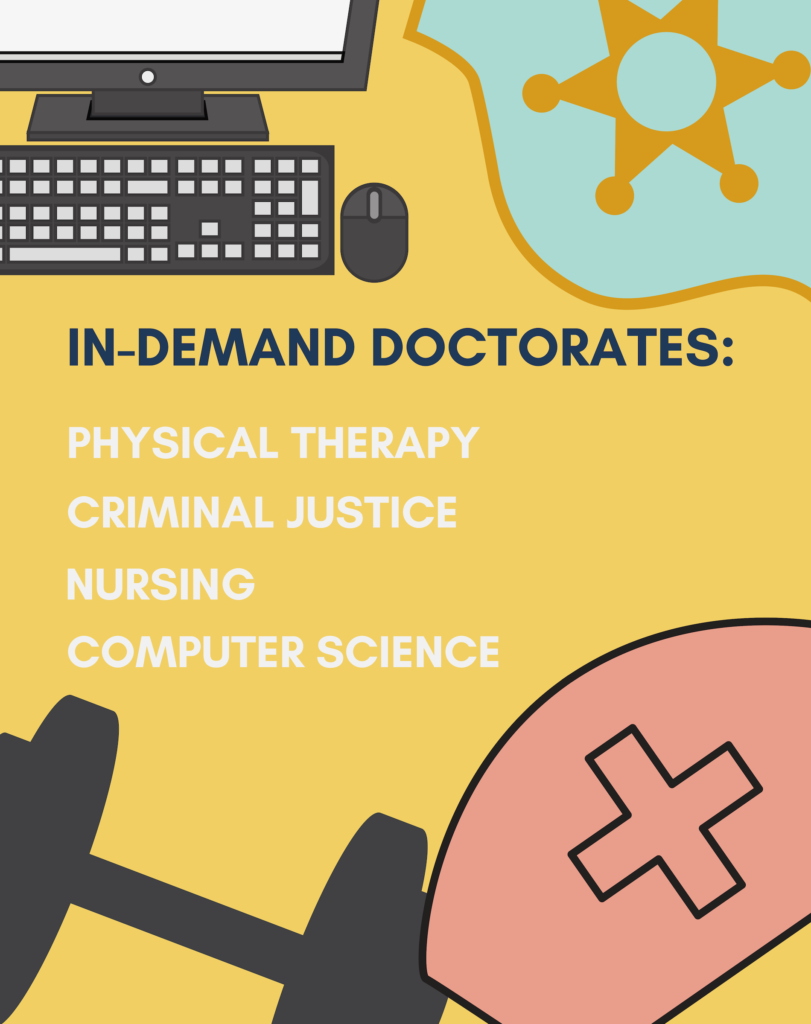
On the other hand, professional doctorates tend to lead to jobs more readily. This makes sense, considering that the entire focus of a professional degree program is on generating the type of innovations that companies, government bodies, and other organizations value. The market is especially strong for health-related professional doctorates, and there is always demand for practitioners of medicine, dentistry, psychiatry, and other healthcare fields. Those who seek out research positions with private companies may also have an easier time finding work, using their skills to solve real-world problems. U.S. News and World Report has identified several areas where the job growth for doctorate holders is exceptionally high. These include:
- Physical therapy: 34% job growth projected between 2014- 2024
- Criminal justice: 20-29% job growth projected between 2014- 2024
- Nursing: 31% job growth projected between 2014- 2024
- Computer science: 16% job growth projected between 2014- 2024
How Much Can I Earn with a Doctorate?
Teaching has long been seen as a calling, and jobs in academia are certainly more about the love than the money. For the 50% of those with a PhD who find work as a tenure track instructor, the Atlantic reports that the average salary is about $60,000. That’s not significantly higher than the average income with a master’s degree, or even a bachelor’s degree. In fact, new grads with a BA earned an average starting salary of $45,478 in 2014, a mere $14,522 less than the rare tenure-track professor.
This low relative salary may be misleading, though. Those who seek a bachelor’s or master’s usually identify earning potential as their reasons for seeking degrees. People who earn a PhD are passionate specialists, and tend to want niche academic careers which support their deep interest. Such positions, while not necessarily lucrative, offer the highest possible prestige and intellectual stimulation. Working in your field of greatest passion may be a reward in and of itself, one which more than justifies the relatively modest income boost that a PhD brings in. If your idea of a good time is expounding to students on your pet subject and sharing your enthusiasm, or probing the outer limits of knowledge in your favorite field by posing your own research questions, a PhD is certainly a wise choice.
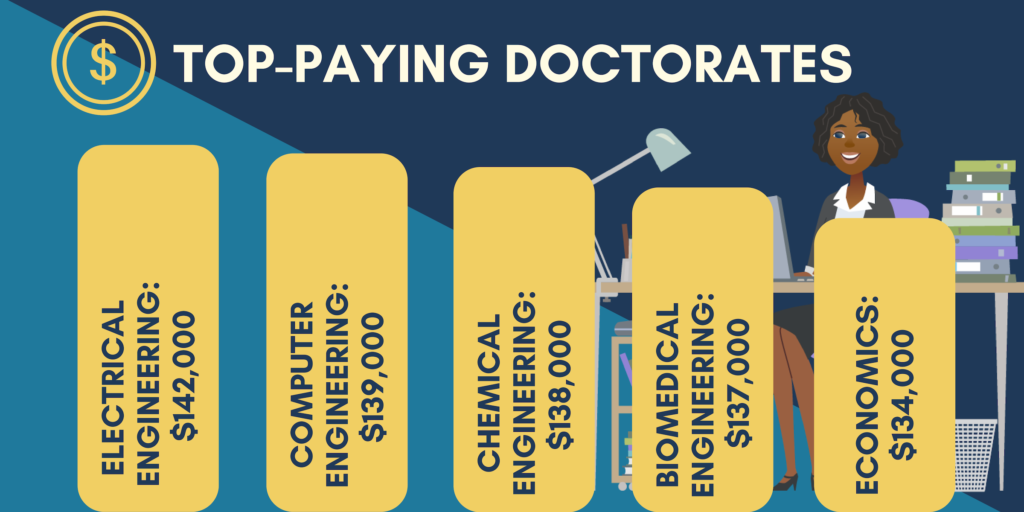
If you have earned a research doctorate with applications in the private sphere, on the other hand, your earnings may be considerably higher. Medical doctors, of course, are famously well compensated, and PayScale finds that the average salary for an MD is $207,000. A doctorate in education (EdD) is associated with an average salary of $78,000, according to PayScale. Professional doctorates tend to earn high salaries as well. that a doctorate in law (JD) is associated with a salary of $87,000, and also reports that a A Doctor of Psychology (PsyD) Degree is associated with an average salary of $77,000. A doctorate in business management earns its holder an average salary of $87,000.
Further Reading:
- What is the Difference in a Doctorate of Business Administration vs. a Ph.D. in Business?
- What Degree Should a Mathematician Have?
- What is the Difference between a Psychologist and Psychotherapist?
- What is the Degree Process for a Career in Research Psychology?
- How Long Does It Take to Become a Psychologist?
- What is the Difference between a Ph.D. in Psychology and a Psy.D.?
- What Is the Benefit of a Nursing Degree Vs a Medical Degree?
- What Is the Benefit of a Nuclear Engineering Degree Vs a Nuclear Physics Degree?
- What Is the Benefit of an Accounting Degree Vs a Mathematics Degree?
- What Is the Benefit of an Aerospace Engineering Degree Vs an Astronomy Degree?
- What Is the Benefit of an Eng.D. Degree Vs a Traditional Ph.D. Degree?
- How Advanced Does My Degree in Engineering Need to Be to Get a Good Job?
- How Advanced Does My Degree in Environmental Engineering Need to Be to Get a Good Job?
- What is the Difference Between a Master’s Degree in Engineering and a PhD in Engineering?
- How Long Does It Take to Become a Doctor?
- What Are the Highest Paying Jobs in Nursing?
